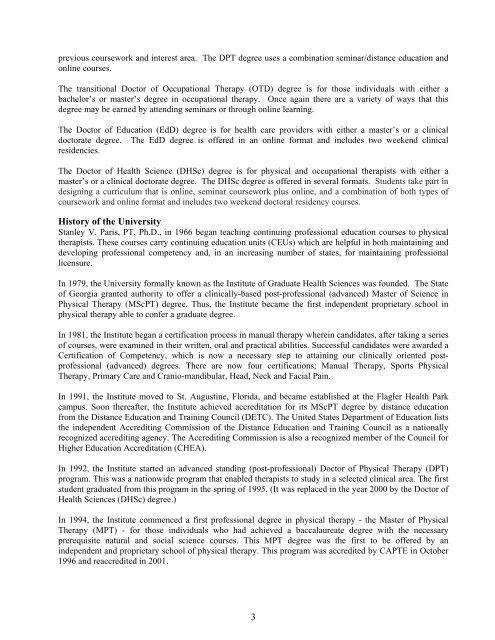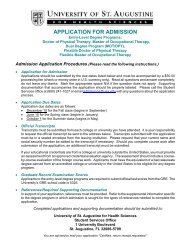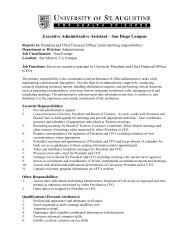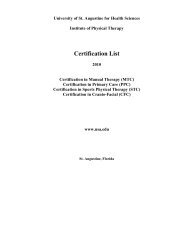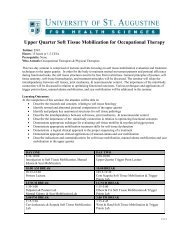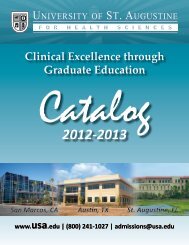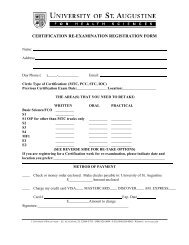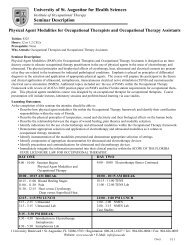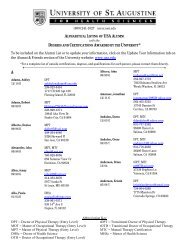CATALOG - University of St. Augustine for Health Sciences
CATALOG - University of St. Augustine for Health Sciences
CATALOG - University of St. Augustine for Health Sciences
Create successful ePaper yourself
Turn your PDF publications into a flip-book with our unique Google optimized e-Paper software.
previous coursework and interest area. The DPT degree uses a combination seminar/distance education andonline courses.The transitional Doctor <strong>of</strong> Occupational Therapy (OTD) degree is <strong>for</strong> those individuals with either abachelor’s or master’s degree in occupational therapy. Once again there are a variety <strong>of</strong> ways that thisdegree may be earned by attending seminars or through online learning.The Doctor <strong>of</strong> Education (EdD) degree is <strong>for</strong> health care providers with either a master’s or a clinicaldoctorate degree. The EdD degree is <strong>of</strong>fered in an online <strong>for</strong>mat and includes two weekend clinicalresidencies.The Doctor <strong>of</strong> <strong>Health</strong> Science (DHSc) degree is <strong>for</strong> physical and occupational therapists with either amaster’s or a clinical doctorate degree. The DHSc degree is <strong>of</strong>fered in several <strong>for</strong>mats. <strong>St</strong>udents take part indesigning a curriculum that is online, seminar coursework plus online, and a combination <strong>of</strong> both types <strong>of</strong>coursework and online <strong>for</strong>mat and includes two weekend doctoral residency courses.History <strong>of</strong> the <strong>University</strong><strong>St</strong>anley V. Paris, PT, Ph.D., in 1966 began teaching continuing pr<strong>of</strong>essional education courses to physicaltherapists. These courses carry continuing education units (CEUs) which are helpful in both maintaining anddeveloping pr<strong>of</strong>essional competency and, in an increasing number <strong>of</strong> states, <strong>for</strong> maintaining pr<strong>of</strong>essionallicensure.In 1979, the <strong>University</strong> <strong>for</strong>mally known as the Institute <strong>of</strong> Graduate <strong>Health</strong> <strong>Sciences</strong> was founded. The <strong>St</strong>ate<strong>of</strong> Georgia granted authority to <strong>of</strong>fer a clinically-based post-pr<strong>of</strong>essional (advanced) Master <strong>of</strong> Science inPhysical Therapy (MScPT) degree. Thus, the Institute became the first independent proprietary school inphysical therapy able to confer a graduate degree.In 1981, the Institute began a certification process in manual therapy wherein candidates, after taking a series<strong>of</strong> courses, were examined in their written, oral and practical abilities. Successful candidates were awarded aCertification <strong>of</strong> Competency, which is now a necessary step to attaining our clinically oriented postpr<strong>of</strong>essional(advanced) degrees. There are now four certifications; Manual Therapy, Sports PhysicalTherapy, Primary Care and Cranio-mandibular, Head, Neck and Facial Pain.In 1991, the Institute moved to <strong>St</strong>. <strong>Augustine</strong>, Florida, and became established at the Flagler <strong>Health</strong> Parkcampus. Soon thereafter, the Institute achieved accreditation <strong>for</strong> its MScPT degree by distance educationfrom the Distance Education and Training Council (DETC). The United <strong>St</strong>ates Department <strong>of</strong> Education liststhe independent Accrediting Commission <strong>of</strong> the Distance Education and Training Council as a nationallyrecognized accrediting agency. The Accrediting Commission is also a recognized member <strong>of</strong> the Council <strong>for</strong>Higher Education Accreditation (CHEA).In 1992, the Institute started an advanced standing (post-pr<strong>of</strong>essional) Doctor <strong>of</strong> Physical Therapy (DPT)program. This was a nationwide program that enabled therapists to study in a selected clinical area. The firststudent graduated from this program in the spring <strong>of</strong> 1995. (It was replaced in the year 2000 by the Doctor <strong>of</strong><strong>Health</strong> <strong>Sciences</strong> (DHSc) degree.)In 1994, the Institute commenced a first pr<strong>of</strong>essional degree in physical therapy - the Master <strong>of</strong> PhysicalTherapy (MPT) - <strong>for</strong> those individuals who had achieved a baccalaureate degree with the necessaryprerequisite natural and social science courses. This MPT degree was the first to be <strong>of</strong>fered by anindependent and proprietary school <strong>of</strong> physical therapy. This program was accredited by CAPTE in October1996 and reaccredited in 2001.3


